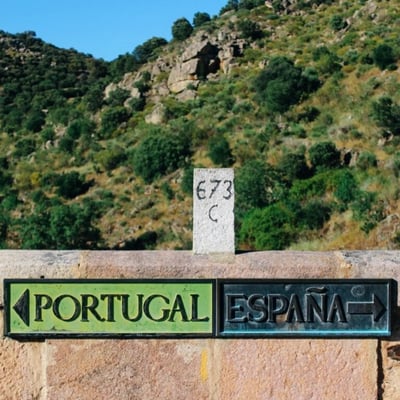1
00:00:03,288 –> 00:00:07,378
Bruna: Oi, Miguel. Que bom ver-te por aqui em Leiria. Como estão os teus filhos?
{{Bruna: Hi, Miguel. Good to see you here in Leiria. How are your kids?}}
2
00:00:08,018 –> 00:00:13,458
Miguel: Olá, Bruna. Os meus filhos estão bem. O mais velho vai agora para a Inglaterra.
{{Miguel: Hello, Bruna. My kids are fine. The oldest is now going to England.}}
3
00:00:14,188 –> 00:00:15,228
Bruna: Por quanto tempo?
{{Bruna: For how long?}}
4
00:00:16,018 –> 00:00:18,288
Miguel: Seis meses. Vai para lá trabalhar.
{{Miguel: Six months. He’s going there to work.}}
5
00:00:18,998 –> 00:00:20,738
Bruna: Ele não trabalha por conta própria?
{{Bruna: Isn’t he self-employed?}}
6
00:00:21,398 –> 00:00:23,048
Miguel: Agora não. Tem um patrão.
{{Miguel: Not anymore. He has a boss.}}
7
00:00:23,658 –> 00:00:25,028
Bruna: Por onde anda ele agora?
{{Bruna: Where is he now?}}
8
00:00:25,558 –> 00:00:28,678
Miguel: Está por Lisboa, mas parte já na segunda-feira.
{{Miguel: He’s in Lisbon, but he leaves on Monday.}}
9
00:00:29,338 –> 00:00:33,138
Bruna: Ter de ir para o estrangeiro por questões financeiras é mesmo triste.
{{Bruna: Having to go abroad for financial reasons is really sad.}}
10
00:00:33,698 –> 00:00:36,478
Miguel: Pois é. Vou ter muitas saudades dele.
{{Miguel: Yeah it is. I’m going to miss him a lot.}}
11
00:00:37,308 –> 00:00:42,028
Mas, ao menos, ele vai telefonar todos os dias, por isso não vai ser assim tão mau.
{{But at least he’s going to call every day, so it won’t be that bad.}}
12
00:00:42,748 –> 00:00:43,848
Bruna: Ele está nervoso?
{{Bruna: Is he nervous?}}
13
00:00:44,548 –> 00:00:45,478
Miguel: Por enquanto, não.
{{Miguel: Not yet.}}
14
00:00:46,178 –> 00:00:50,928
Bruna: Ainda bem. Por muito difícil que seja ele ir embora, é o melhor que tem a fazer…
{{Bruna: Good. As difficult as it is to leave, it is the best thing to do…}}
15
00:00:51,408 –> 00:00:55,858
Miguel: Já agora, sabes se o Minipreço ainda está aberto? Tenho de passar por lá.
{{Miguel: By the way, do you know if Minipreço is still open? I have to stop by there.}}
16
00:00:56,318 –> 00:01:00,588
Bruna: Está, mas fecha por volta das 21, por isso tens de te despachar.
{{Bruna: Yes, but it closes around 21:00 (9 p.m.), so you have to hurry up.}}
17
00:01:01,118 –> 00:01:04,558
Miguel: Obrigado. Tenho de comprar o jantar a caminho de casa.
{{Miguel: Thank you. I have to buy dinner on the way home.}}
18
00:01:04,928 –> 00:01:06,168
Bruna: Vais para casa por onde?
{{Bruna: Which way are you going home?}}
19
00:01:06,558 –> 00:01:07,928
Miguel: Vou apanhar a auto-estrada.
{{Miguel: I’m going to take the highway.}}
20
00:01:08,368 –> 00:01:10,008
Bruna: Então se calhar ainda tens tempo.
{{Bruna: Then maybe you still have time.}}
21
00:01:10,488 –> 00:01:13,838
Miguel: Ui, não sei. Já são 20h45.
{{Miguel: Ooff, I don’t know. It’s already 20:45 (8:45 p.m.)}}
22
00:01:14,308 –> 00:01:18,068
Bruna: Sim, mas, por acaso, ouvi dizer que tu conduzes como um louco.
{{Bruna: Yes, but, coincidentally, I heard that you drive like a madman.}}
23
00:01:18,568 –> 00:01:20,978
Miguel: Não conduzo nada! Por quem me tomas?
{{Miguel: No I don’t! Who do you take me for?}}
24
00:01:21,408 –> 00:01:22,928
Bruna: Foi a tua mulher que me disse.
{{Bruna: It was your wife who told me.}}
25
00:01:23,398 –> 00:01:27,288
Miguel: Não sei por que raio anda ela a dizer essas coisas, mas está bem…
{{Miguel: I don’t know why the hell she goes around saying those things, but fine…}}
26
00:01:27,788 –> 00:01:30,598
Bruna: Decerto que ela só disse isso por preocupação.
{{Bruna: I’m sure she only said that out of concern.}}
27
00:01:31,088 –> 00:01:33,048
Miguel: Claro, claro. Vou-me embora.
{{Miguel: Of course, of course. I’m leaving.}}
28
00:01:33,518 –> 00:01:37,408
O Minipreço está quase a fechar, mas com sorte ainda consigo passar por lá.
{{Minipreço is about to close, but with luck I can still stop by there.}}
29
00:01:37,798 –> 00:01:39,468
Bruna: Tchau! E boa sorte!
{{Bruna: Bye! And good luck!}}
 We respect your privacy and have a ZERO TOLERANCE for spam.
We respect your privacy and have a ZERO TOLERANCE for spam.
















Oi, tenho dificuldade entender esta frase:
“Por muito difícil que seja ele ir embora, é o melhor que tem a fazer…”
Pode explicar-me como faz sentido?
Talvez ajude se eu traduzir a frase para o inglês parte por parte:
– Por muito difícil (As hard) que seja (as it is) ele (for him) ir (to go) embora (away), é (it is) o melhor (the best) que tem (he has) a fazer (to do). –> As hard as it is for him to go away, it’s the best thing he can do.
Por que é que o pronome as vezes é depois o verbo “anda”?
Como é o caso em “Por onde anda ele agora?” e “… anda ela a dizer essas coisas”.
Olá, Mackenzie. A ordem das palavras muitas vezes não é fixa em português, por isso, há palavras que podem ser colocadas em diferentes posições nas frases sem que isso mude o significado, com uma ou outra exceção. Por onde (é que) anda ele agora? = Por onde (é que) ele anda agora? 🙂
Olá. Before I listened to this shortie I listened to one featuring Rui and understood everything. This one I found extremely difficult and was very discouraged Both are level A2. What is the criteria for the different levels? Surely this shortie should be level B1?
Sorry that this was discouraging! The levels are just as estimate, as the CEFR criteria is subjective and more focused on the overall communicative ability at different levels, rather than which specific concepts are known. (There may be a “Rui factor” here too — his voice is more clear than the average speaker, which makes his episodes feel easier. 🙃)
We base our decisions on a combination of the “Common European Framework of Reference for Languages” (CEFR) guidelines, automatic tools, comparisons to when concepts are typically presented in different courses/books/etc, our own judgment, and user feedback.
I agree that when you take it in as a whole, it might lean more towards B1.
The reason we set it at A2 was because most of the concepts are covered in the A1/A2 units: prepositions, possessives, questions, numbers, time, adjectives, demonstratives, adverbs, etc., and it’s mostly in the present tense (presente do indicativo), with some instances of the simple past (pretérito perfeito). There are a few B1 concepts though: clitic pronouns, “seja” – presente do conjuntivo, and some less common vocabulary.
That said, there’s a big difference between what is “covered” and what can be understood when it’s all put together in a dialogue. There is SO much to learn in A1 and A2 that it will take a long time to internalize. One A2 dialogue might be understood entirely, and another might serve a more specific function at first (i.e. just exploring how “por” is used in different ways, rather than fully grasping the whole thing). That’s a strong factor here: since the main focus of this episode is on the preposition “por”, and prepositions are such a major part of A2, keeping it A2 makes it more likely to be found by people working on the A2 units.
Olá Molly. Many thanks for your comprehensive answer. I agree there could be a ‘Rui’ factor as I do feel his dialogue easier to understand. I was disappointed that I couldn’t understand hardly anything Natacha said. I understood the words when I read the transcript but its the way she speaks that throws me. Hopefully that will come with more listening practise! 😊